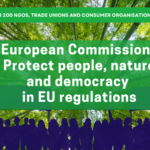French President Emmanuel Macron will today welcome over 50 leaders from around the world, two years after the adoption of the Paris Agreement. Leaders and international financial institutions must seize this opportunity to ramp up their ambition and end support for fossil fuels, writes Maeve McLynn.
Maeve McLynn is finance and subsidies policy coordinator at Climate Action Network (CAN) Europe.
Originally published by EURACTIV on 12 December 2017.
The One Planet Summit, organised together with UN Secretary General Antonio Guterres and World Bank President Jim Yong King sets out to demonstrate clearly to the world that the Paris Agreement is being transformed from talk and text into real action.
Importantly, the summit will shine a light on the mechanics of making such action a reality; namely the financial support and investments that are needed to make fossil fuel economies a thing of the past and climate-resilient and clean energy economies a thing of today.
There is room for hope
A number of initiatives targeting the global transition away from fossil fuels have been established over the last two years, and most recently at the international climate summit in Bonn.
Such plans include the Powering Past Coal initiative launched by the Canadian and UK governments in November this year and announcements from countries, businesses and cities on their intention to be carbon neutral by 2050.
These examples, among others, give reason to believe that the Paris Agreement is not a one-off trophy to be admired. Rather, it is the badge of honour that countries and non-state actors intend to both defend and fulfil.
The One Planet Summit sums up in its name what it intends to achieve; working together as an international community to protect our planet from one of the most pressing crises of our time. But we cannot ignore the disclaimer: there is still a worryingly wide gap between what needs to be done and what is actually being done to address climate change.
Without real ambition from our governments to cut greenhouse gas emissions and strengthen solidarity with those most vulnerable to climate change impacts, and without the financial sector taking more responsibility for building decarbonised and resilient economies, the One Planet Summit will be little more than a pat on the back for doing slightly greener business as usual.
If governments are serious about fulfilling the Paris Agreement, the vast majority of fossil fuels will need to be left in the ground, and all countries will need to shift to clean and zero-carbon energy systems. On top of that, scaled up financial support, technology and resources will be needed to build resilience in countries that are at the forefront of climate change.
Time to stop fueling the problem
There is a growing consensus that one of the first actions governments must take to incentivise our energy transition and keep fossil fuels in the ground is to remove financial support and subsidies for fossil fuels. Yet despite the consensus – and the evidence to back it up – the demand to end support for fossil fuels continues to go unnoticed or is blatantly ignored by our leaders.
While European governments espouse their long-standing support for the Paris Agreement and while international financial institutions tout their investments in green energy solutions, they fail to acknowledge their on-going and persistent support to fossil fuels.
A recent report shows that Europe has spent at least €121 billion a year in subsidies to fossil fuel production and consumption from 2014 to 2016. This Jekyll and Hyde approach ends up hindering progress towards more ambitious climate action and diverts attention away from the inconvenient reality that we are much further away from achieving a decarbonised and climate-resilient planet than we need to be.
The subsidies provided by governments and financial institutions distort the energy market by primarily benefiting a handful of energy-intensive and large polluting industry, while obstructing European and international transition to clean, renewable-based energy.
Meanwhile, the benefits to phasing out fossil fuel subsidies include the potential to invest more in research and innovation in clean technologies such as energy efficiency and renewable energy, as well as contributing to healthier and cleaner local environments, and easing government budgets.
While leaders talk a good talk in Paris, the real expectation of people and communities is that fossil fuel economies are part of our history, and have no place in our future. The One Planet Summit can be the departure point from where our governments can make an honest start by fulfilling their commitment to end financial support to fossil fuels.



